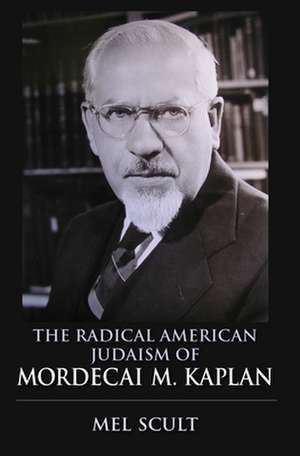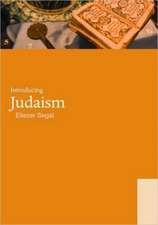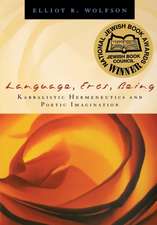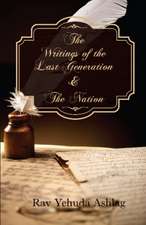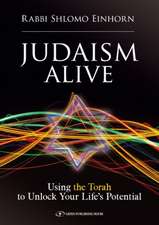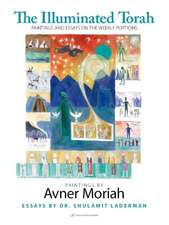The Radical American Judaism of Mordecai M. Kaplan: The Modern Jewish Experience
Autor Mel Sculten Limba Engleză Hardback – 28 noi 2013
| Toate formatele și edițiile | Preț | Express |
|---|---|---|
| Paperback (1) | 216.12 lei 3-5 săpt. | |
| MH – Indiana University Press – 18 mar 2015 | 216.12 lei 3-5 săpt. | |
| Hardback (1) | 300.55 lei 6-8 săpt. | |
| MH – Indiana University Press – 28 noi 2013 | 300.55 lei 6-8 săpt. |
Din seria The Modern Jewish Experience
-
 Preț: 216.12 lei
Preț: 216.12 lei -
 Preț: 305.51 lei
Preț: 305.51 lei -
 Preț: 312.71 lei
Preț: 312.71 lei -
 Preț: 334.45 lei
Preț: 334.45 lei -
 Preț: 214.07 lei
Preț: 214.07 lei -
 Preț: 343.77 lei
Preț: 343.77 lei -
 Preț: 200.19 lei
Preț: 200.19 lei -
 Preț: 189.76 lei
Preț: 189.76 lei -
 Preț: 339.86 lei
Preț: 339.86 lei -
 Preț: 230.80 lei
Preț: 230.80 lei -
 Preț: 184.58 lei
Preț: 184.58 lei -
 Preț: 246.40 lei
Preț: 246.40 lei -
 Preț: 244.28 lei
Preț: 244.28 lei -
 Preț: 245.86 lei
Preț: 245.86 lei -
 Preț: 159.50 lei
Preț: 159.50 lei -
 Preț: 338.12 lei
Preț: 338.12 lei -
 Preț: 264.29 lei
Preț: 264.29 lei -
 Preț: 219.77 lei
Preț: 219.77 lei -
 Preț: 242.77 lei
Preț: 242.77 lei -
 Preț: 287.93 lei
Preț: 287.93 lei -
 Preț: 210.44 lei
Preț: 210.44 lei -
 Preț: 188.48 lei
Preț: 188.48 lei -
 Preț: 165.49 lei
Preț: 165.49 lei -
 Preț: 160.85 lei
Preț: 160.85 lei -
 Preț: 245.43 lei
Preț: 245.43 lei -
 Preț: 163.36 lei
Preț: 163.36 lei -
 Preț: 294.35 lei
Preț: 294.35 lei -
 Preț: 193.85 lei
Preț: 193.85 lei -
 Preț: 230.67 lei
Preț: 230.67 lei -
 Preț: 284.82 lei
Preț: 284.82 lei -
 Preț: 222.99 lei
Preț: 222.99 lei -
 Preț: 175.82 lei
Preț: 175.82 lei -
 Preț: 164.98 lei
Preț: 164.98 lei -
 Preț: 250.60 lei
Preț: 250.60 lei -
 Preț: 289.92 lei
Preț: 289.92 lei -
 Preț: 221.00 lei
Preț: 221.00 lei -
 Preț: 222.01 lei
Preț: 222.01 lei -
 Preț: 176.76 lei
Preț: 176.76 lei
Preț: 300.55 lei
Nou
Puncte Express: 451
Preț estimativ în valută:
57.51€ • 59.93$ • 47.62£
57.51€ • 59.93$ • 47.62£
Carte tipărită la comandă
Livrare economică 03-17 aprilie
Preluare comenzi: 021 569.72.76
Specificații
ISBN-13: 9780253010759
ISBN-10: 0253010756
Pagini: 360
Ilustrații: 1 b&w illustrations
Dimensiuni: 152 x 229 x 15 mm
Greutate: 0.7 kg
Editura: MH – Indiana University Press
Seria The Modern Jewish Experience
ISBN-10: 0253010756
Pagini: 360
Ilustrații: 1 b&w illustrations
Dimensiuni: 152 x 229 x 15 mm
Greutate: 0.7 kg
Editura: MH – Indiana University Press
Seria The Modern Jewish Experience
Cuprins
AcknowledgmentsPrefaceIntroduction1. Excommunications: Kaplan and Spinoza2. Self-Reliance: Kaplan and Emerson3. Nationalism and Righteousness: Ahad Ha-Am and Matthew Arnold4. Universalism and Pragmatism: Felix Adler, William James, and John Dewey5. Kaplan and Peoplehood: Judaism as a Civilization and Zionism6. Kaplan and His God: An Ambivalent Relationship7. Kaplan's Theology: Beyond Supernaturalism8. Salvation: The Goal of Religion9. Salvation Embodied: The Vehicle of Mitzvot10. Mordecai the Pious: Kaplan and Heschel11. The Law: Halakhah and Ethics12. Kaplan and the Problem of Evil: Cutting the Gordian KnotConclusionAppendix: "Thirteen Wants" of Mordecai Kaplan ReconstructedNotesSelected Bibliography and Note on SourcesIndex
Recenzii
"An important and powerful work that speaks to Mordecai M. Kaplan's position as perhaps the most significant Jewish thinker of the twentieth century.... Scult shows Kaplan's theology to be imbued with American values of democracy and individualism." Deborah Dash Moore, coeditor of Gender and Jewish History
"An important and powerful work that speaks to Mordecai M. Kaplan's position as perhaps the most significant Jewish thinker of the twentieth century... Scult shows Kaplan's theology to be imbued with American values of democracy and individualism." - Deborah Dash Moore, coeditor of Gender and Jewish History
"An important and powerful work that speaks to Mordecai M. Kaplan's position as perhaps the most significant Jewish thinker of the twentieth century... Scult shows Kaplan's theology to be imbued with American values of democracy and individualism." - Deborah Dash Moore, coeditor of Gender and Jewish History
